Multi-dimensional plots of change
http://smitainasia.blogspot.com/
The Delhi Belly. No, it's not from eating too much - rather, it's a rite of passage that a naive, yet ambitious traveler in India must go through in order to be ordained a true adventurer. You guessed it, diarrhea. This blog is about this, and many other tales about my summer in India before I begin business school in Fall.
 As far as I can remember, cows used to roam the streets of Noida (and Delhi, and every other city in India). However, this time, they were almost nowhere to be seen. Apparently, the government had put out a scheme to capture these cows - anyone who caught one and gave it to the authorities would get Rs. 3000. There began the rat-race to catch these cows - chasing cows, grabbing others', resulting in overall violence.
As far as I can remember, cows used to roam the streets of Noida (and Delhi, and every other city in India). However, this time, they were almost nowhere to be seen. Apparently, the government had put out a scheme to capture these cows - anyone who caught one and gave it to the authorities would get Rs. 3000. There began the rat-race to catch these cows - chasing cows, grabbing others', resulting in overall violence.

Sarika Sari Centre is the name of the store that my uncles and cousins own in a town in  It was here where I met the keenest and most creative businessmen, who operated in a climate of minimal purchasing power and political instability, with deft and unwavering optimism.
It was here where I met the keenest and most creative businessmen, who operated in a climate of minimal purchasing power and political instability, with deft and unwavering optimism.
 The land where cable optic fibers intricately connect towns and cities and eBay is a standard business platform is a far cry from half way around the planet, where the train system forms the veins of commerce and loud, guttural bidding is the norm. I watch as my cousins travel tirelessly in non-air-conditioned trains from one corner of the country to another to pick out the latest clothing materials. Manish, my enterprising cousin with a glint in his eye, had a new idea – why not make shirts that are ready-made? That way the purchaser doesn’t have to get his own shirt tailored? What could we call the label
The land where cable optic fibers intricately connect towns and cities and eBay is a standard business platform is a far cry from half way around the planet, where the train system forms the veins of commerce and loud, guttural bidding is the norm. I watch as my cousins travel tirelessly in non-air-conditioned trains from one corner of the country to another to pick out the latest clothing materials. Manish, my enterprising cousin with a glint in his eye, had a new idea – why not make shirts that are ready-made? That way the purchaser doesn’t have to get his own shirt tailored? What could we call the label
 It never ceases to amaze me how many lives are precariously tied to this one enterprise - from the busy tailor, to the bicycle-mounted tea vendor, to the wives and children making their way from school - this store is the life and blood of many; unfortunately, it is one of the few successful ones in a town with a dried out economy and low infrastructure reliability.
It never ceases to amaze me how many lives are precariously tied to this one enterprise - from the busy tailor, to the bicycle-mounted tea vendor, to the wives and children making their way from school - this store is the life and blood of many; unfortunately, it is one of the few successful ones in a town with a dried out economy and low infrastructure reliability.
 The recent suicides of farmers throughout the country reveal the depth of utter despair of our rural citizens. The Prime Minister, during a visit to Sewa Gram where Gandhiji had set up his ashram to practice his 'Experiments with Truth', gave an impressive interview to the Economic Times. Perhaps one could presume that India is finally being led by a man who dares to not part with his principles while being progressive in his thinking, and who is smart enough to realize that 'Mahatma Gandhi was the most modern Indian'.
The recent suicides of farmers throughout the country reveal the depth of utter despair of our rural citizens. The Prime Minister, during a visit to Sewa Gram where Gandhiji had set up his ashram to practice his 'Experiments with Truth', gave an impressive interview to the Economic Times. Perhaps one could presume that India is finally being led by a man who dares to not part with his principles while being progressive in his thinking, and who is smart enough to realize that 'Mahatma Gandhi was the most modern Indian'.
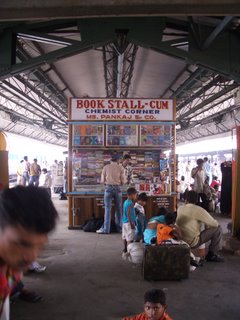 the duo described the lives and dreams of these children, and answered questions that had always plagued me before - why they run away from their homes, what they did for a living. Indeed, the stories were mostly tragic, including beatings from the police, gang wars, drugs, sexual abuse and forced prostitution (for the girls) - but they managed to squeeze in a few humorous tales about the children's small victories and their obsession with films. From their unique relationships they build with vendors (such as the Chemist, for medicine) or the fruit juice-walla (fruit in exchange for protection), to the sleeping places that they find (such as the tin roofs under the walkway in the picture), we we are amazed with these children' resourcefulness. Some run away from home because of poverty (the feeling of being a burden on their families), while others embark a train for fun, but find themselves lost forever.
the duo described the lives and dreams of these children, and answered questions that had always plagued me before - why they run away from their homes, what they did for a living. Indeed, the stories were mostly tragic, including beatings from the police, gang wars, drugs, sexual abuse and forced prostitution (for the girls) - but they managed to squeeze in a few humorous tales about the children's small victories and their obsession with films. From their unique relationships they build with vendors (such as the Chemist, for medicine) or the fruit juice-walla (fruit in exchange for protection), to the sleeping places that they find (such as the tin roofs under the walkway in the picture), we we are amazed with these children' resourcefulness. Some run away from home because of poverty (the feeling of being a burden on their families), while others embark a train for fun, but find themselves lost forever.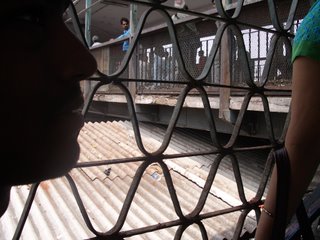 his friends had deserted him. Now, 12 years later, he has not been able to find his family, and has faced numerous tragedies along the way, including being stabbed by other children. This is where Salaam Baalak Trust came into his life.
his friends had deserted him. Now, 12 years later, he has not been able to find his family, and has faced numerous tragedies along the way, including being stabbed by other children. This is where Salaam Baalak Trust came into his life. They even help find the childrens' homes. The children are also part of the ChildLine program which provides a hotline service for street children.
They even help find the childrens' homes. The children are also part of the ChildLine program which provides a hotline service for street children.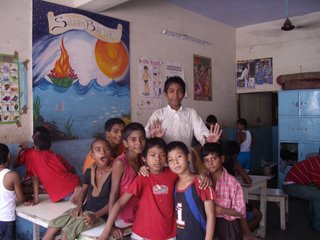 He's also interested in social worker (he works at the Trust as a mentor), and has dreams of working at UNICEF to make a difference in rural India. Shekar is on his way to Bollywood, with a few films underway already, including one on how Salaam changed his life.
He's also interested in social worker (he works at the Trust as a mentor), and has dreams of working at UNICEF to make a difference in rural India. Shekar is on his way to Bollywood, with a few films underway already, including one on how Salaam changed his life.
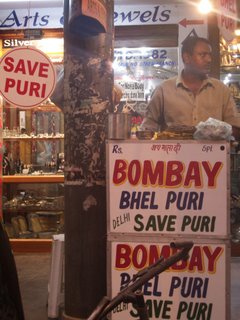 I begin my travels with my companion, my ever resourceful and inquisitive cousin, Saurabh. The quest - find and document NGOs and grassroots organizations that are making a difference, particularly in the rural employment sector. Whenever I travel, I try to be as environmentally and socially responsible as possible.
I begin my travels with my companion, my ever resourceful and inquisitive cousin, Saurabh. The quest - find and document NGOs and grassroots organizations that are making a difference, particularly in the rural employment sector. Whenever I travel, I try to be as environmentally and socially responsible as possible.
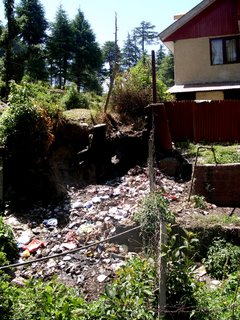
On a recent trip to Haridwar, someone had recommended visiting the
The urgency of the situation is clear. According to a recent article by Dr. R. Venkatesan of the National Institute of Ocean Technology, there exists a swirling pool of plastic the size of
What can we do?
As consumers, we can do the following:
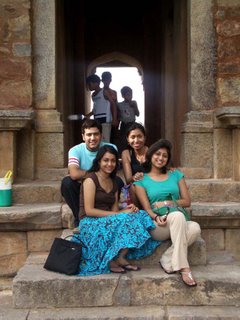 Built around 1300 AD by Khalji Sultan Ala al-din, this structure was created as a water tank for the kingdom. Despite its crumbling facade, this monument maintains an aura of grace through its corridors, tombs, gardens and the surrounding jade-green lake.
Built around 1300 AD by Khalji Sultan Ala al-din, this structure was created as a water tank for the kingdom. Despite its crumbling facade, this monument maintains an aura of grace through its corridors, tombs, gardens and the surrounding jade-green lake.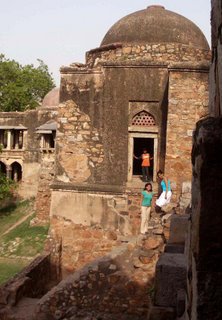

 For years, we dreamed of making a family trip to Kashmir. We argued, read avidly about reports on terrorism and looked around for opinions. We finally determined that the propitious time had arrived - Kashmir, the mother of Indian natural beauty, was calling us.
For years, we dreamed of making a family trip to Kashmir. We argued, read avidly about reports on terrorism and looked around for opinions. We finally determined that the propitious time had arrived - Kashmir, the mother of Indian natural beauty, was calling us.
 At last count, our family numbered 88 people in the house. That is, my home in Gaya, Bihar - the holy city where Buddha attained enlightenment.
At last count, our family numbered 88 people in the house. That is, my home in Gaya, Bihar - the holy city where Buddha attained enlightenment. defined, with no roles overlapping each other. Bread-winning and child-rearing are distinctly different roles - and the customs and habits have been practiced to perfection over centuries.
defined, with no roles overlapping each other. Bread-winning and child-rearing are distinctly different roles - and the customs and habits have been practiced to perfection over centuries.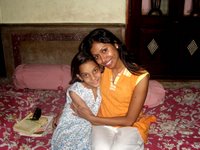 recount tales of the house. The daughters of the house are slowly married off, leaving room for new wives and offspring. They leave behind old memories and carefully framed photographs of their childhood, wedding. My Babuji (my dad's eldest brother), is the patriarch, ruling over family matters in a wise and just manner. He showers an unending stream of love towards the youngsters, and we all listen with deference when he speaks.
recount tales of the house. The daughters of the house are slowly married off, leaving room for new wives and offspring. They leave behind old memories and carefully framed photographs of their childhood, wedding. My Babuji (my dad's eldest brother), is the patriarch, ruling over family matters in a wise and just manner. He showers an unending stream of love towards the youngsters, and we all listen with deference when he speaks.
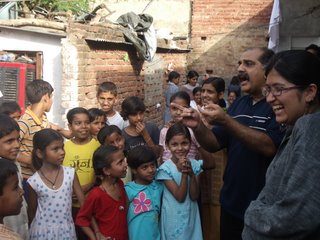 The kids of Saksham Vidhyalaya are an indefatigable force. Their quest to learn, despite unfavorable conditions at home, continues to inspire me. Saksham is a school set within the Nithari slum in Noida, providing education for free.
The kids of Saksham Vidhyalaya are an indefatigable force. Their quest to learn, despite unfavorable conditions at home, continues to inspire me. Saksham is a school set within the Nithari slum in Noida, providing education for free.
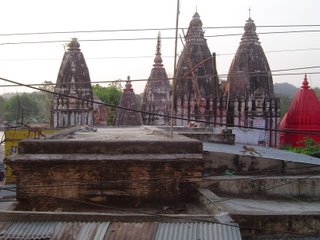 When I was finally over my jetlag, Smita, my dad and I set off for Haridwar. This holy city represents the meeting point of the giant Himalayas and the plains, and is a major pilgrimage site for Hindus. The city is alive at night, bustling with street stalls selling glistening trinkets, bright powders and garlands of marigolds. The beautiful, tiny streets, breeze from the river, sounds of chanting emanating from temples, transport you into an utopian era, one existing several lifetimes before. The peaceful Holy Ganga site is a microcosm in itself, inviting locals and travelers into its waters, promising purity despite the human emissions
When I was finally over my jetlag, Smita, my dad and I set off for Haridwar. This holy city represents the meeting point of the giant Himalayas and the plains, and is a major pilgrimage site for Hindus. The city is alive at night, bustling with street stalls selling glistening trinkets, bright powders and garlands of marigolds. The beautiful, tiny streets, breeze from the river, sounds of chanting emanating from temples, transport you into an utopian era, one existing several lifetimes before. The peaceful Holy Ganga site is a microcosm in itself, inviting locals and travelers into its waters, promising purity despite the human emissions  into its body. Leaf-made plates, toothpaste, soap, sweat, ashes - all make their way into the waters. The giant statue of Shiva near Hari-ki-pairi (feet of Shiva) overlooks the faithful bathers, turning into a majestic shadow into the evening, providing security and comfort to the city's sleeping inhabitants.
into its body. Leaf-made plates, toothpaste, soap, sweat, ashes - all make their way into the waters. The giant statue of Shiva near Hari-ki-pairi (feet of Shiva) overlooks the faithful bathers, turning into a majestic shadow into the evening, providing security and comfort to the city's sleeping inhabitants.
Rahul Brown, an inspirational friend whom I recently met, had recently written a humorous, yet powerful anecdote about his experience with the ragpicker community and his first encounter with unabashed nose-blowing commonly seen in
Since I have arrived, I've once again begun to quietly watch people cough out their phlegm with great gusto every time they feel a slight onset of thickness at the back of their throats. I watch in wonder at the reverent tolerance that passersby display as a piece of translucent phlegm passes diagonally in front of them on a footpath. Or how it is incorporated into the morning bath (most gutturally) and the daily yoga ritual.
I find myself using innumerable reams of toilet paper to capture the ongoing phlegm, a symptom of being in a dusty environment and moving between scorching heat to AC environs. But for those who think of paper products as a luxury, or haven't ever been exposed to that concept, blowing into one's fingers is almost necessary. Phlegm, as I have learned from my yogic family, leads your body to diseases of every type, getting trapped in your lungs, stomach, intestines, leading to gradual, slime-like build up, causing resistance to your internal bodily activities. It is, overall, a disgusting, life-thwarting substance. To understand this, and many of the seemingly unpleasant aspects of Indian life, and its juxtaposition to incomparable grace and beauty, is to understand the complexities of
Arriving on April 17th, right on my sister, Smita's birthday, I decided to surpise my parents about my visit to India. After all, it has been three years - what greater surprise could there be! My parents arose at 3am, not believing my presence. At the moment that I entered their bedroom door, I felt a surge at the back of my throat, wishing that I had done this years earlier.